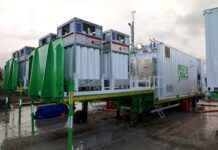
Artificial intelligence (AI) has already arrived in some areas of the energy industry and has the potential to further advance the integrated energy transition – such are the findings of a recent analysis by the German Energy Agency – Deutsche Energie-Agentur (dena) – titled “Artificial Intelligence – from Hype to Reality in the Energy Industry”.
It examined the technical development status and the cost-benefit ratio for nine specific areas of application and provided some recommended courses of action. Establishing AI more firmly in the energy industry in future requires more intense exchange between stakeholders, pilot projects and sustainability concepts.
Andreas Kuhlmann, Chief Executive of dena, explained: “Initial positive examples from the energy industry show that AI can drive new business models, accelerate innovation and help increase the potential for efficiency. However, it will only make a substantial contribution to the integrated energy transition if it is allowed free rein now and positive experiences from initial applications are transferred to other segments of the energy system. The exchange and transfer of knowledge between stakeholders from the digital and energy industries are particularly important in this regard.”
Dr Christoph Scholten, Head of the “Digitalisation of the Energy Transition” Unit at the Federal Ministry for Economic Affairs and Energy, added: “In the future, we will see more and more AI components at every stage of the value chain. To ensure successful interplay between these in the overall system, it is necessary to quickly develop knowledge that will form the basis of a holistic strategy for the application of artificial intelligence within the energy industry. That is why we are also building on the findings of the analysis in the newly established “Future Energy Lab”, in conjunction with dena. In this lab, innovative digital technologies for concrete applications in the energy industry will be tested through 2022 as part of the federal government’s blockchain strategy.”
Boosting pilot projects and sustainability
One of the findings of the dena analysis was that increasing the potential of AI for the various areas of application of an integrated energy transition requires, above all, additional pilot projects, including some to determine the net benefit of AI. In addition to technical and economic benefits, sustainability, in particular, must become a key criterion for evaluating AI projects. For an AI application to succeed, it is always necessary to check whether its benefits actually outweigh the effort required.
Greatest potential lies in forecasting and in optimising operations and inventories
The greatest potential of AI to contribute to the energy transition lies in the areas in forecasting and in optimising operations and inventories. For example, AI can be used to predict the production and demand of fluctuating renewable energy sources earlier on and more precisely, for power generation and trading purposes. In the field of operational optimisation, the operational planning of power generation units has great potential for the use of AI. The technology also offers increasing opportunities in optimised grid operation, especially as a result of the increased dissemination of sensor data in future. For example, AI can improve local grid utilisation and detect critical conditions earlier.
In contrast, the areas of maintenance and safety are often still in the research stage due to their higher complexity, e.g. because of the required use of drones and robots. In this case, particularly high investment costs have so far inhibited AI from contributing to an integrated and stable energy system.
Easier access for active consumers
In sales and consumer services, AI is primarily used for individualised products and automated reading and billing. So far, this area of application has focused on improving services and customer relationships. With an eye to the future, however, the analysis shows great potential for simplifying the participation of active consumers in the integrated energy transition, e.g. through the automated sale of self-generated electricity from private photovoltaic systems. AI can also make it possible to manage energy to increase consumption from households’ own photovoltaic battery systems or identify small-scale potential for efficiency. The technology will make established energy industry processes accessible to small stakeholders as well.
The EnerKI project
This in-depth analysis report concludes the project “Using Artificial Intelligence to Optimise the Energy System”, which was launched in early 2019. The aim of this dena project was to expand knowledge of AI within the energy industry while gauging the potential of AI for the energy transition, initiating a broad dialogue among the relevant stakeholders, and making the findings available to them. For more information visit: www.dena.de/en/artificial-intelligence/







